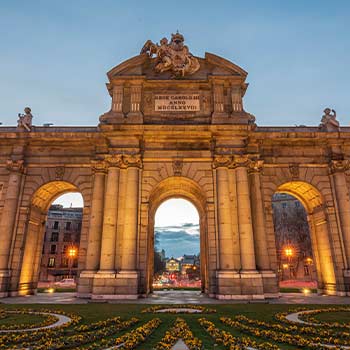International Weapons Law - Period 4
Social Sciences & Humanities Program
Amsterdam, Netherlands
Dates: 2/1/24 - 6/1/24

International Weapons Law - Period 4
OVERVIEW
CEA CAPA Partner Institution: Vrije Universiteit Amsterdam
Location: Amsterdam, Netherlands
Primary Subject Area: Law
Instruction in: English
Course Code: R_IWL
Transcript Source: Partner Institution
Course Details: Level Graduate
Recommended Semester Credits: 3
Contact Hours: 84
Prerequisites: Basic knowledge of legal regulation and public international law.
DESCRIPTION
The international law of weapons existing today comprises a large variety of rules from different levels. Weapons of mass destruction are governed by a comprehensive regime, but in the field of conventional arms, the rules are less extensive and leave more leeway for states. Because of the direct link with national security, regulation in this area is a sensitive issue for states. Existing treaties in this area thus often only govern specific categories of weapons, and they may differ in their scope of regulation ? from a complete ban to mere limitations on the manufacture or trade in arms.
After providing an overview on general sources on international weapons law and institutions dealing with weapons, arms control and disarmament (including weapons of mass destruction), this course will address the laws governing the manufacture of and trade in conventional arms. Regulations and controls in this field have been adopted at the national, regional, and international (global) levels. Students will reflect on the ways in which these different levels of action relate to each another. Moreover, the course will cover the variety of actors involved in the development and implementation of arms control measures. Attention will be paid to the Arms Trade Treaty (entered into force on 24 December 2014), regulating the international trade in conventional arms.
Students will also be introduced to new technologies and the challenges they pose for the regulation and control of small arms and light weapons, such as record keeping and tracing. Moreover, the course will cover EU law on export controls, and address the legal framework of export controls on dual-use goods?goods that can be used for both civilian and military purposes. Legal challenges posed by autonomous weapons systems, which select and engage targets without human intervention, will receive separate attention. The role of civil society in shaping international weapons law will also be covered.
Vrije Universiteit Amsterdam (VU Amsterdam) awards credits based on the ECTS system. Contact hours listed under a course description may vary due to the combination of lecture-based and independent work required for each course therefore, CEA's recommended credits are based on the ECTS credits assigned by VU Amsterdam. 1 ECTS equals 28 contact hours assigned by VU Amsterdam.
After providing an overview on general sources on international weapons law and institutions dealing with weapons, arms control and disarmament (including weapons of mass destruction), this course will address the laws governing the manufacture of and trade in conventional arms. Regulations and controls in this field have been adopted at the national, regional, and international (global) levels. Students will reflect on the ways in which these different levels of action relate to each another. Moreover, the course will cover the variety of actors involved in the development and implementation of arms control measures. Attention will be paid to the Arms Trade Treaty (entered into force on 24 December 2014), regulating the international trade in conventional arms.
Students will also be introduced to new technologies and the challenges they pose for the regulation and control of small arms and light weapons, such as record keeping and tracing. Moreover, the course will cover EU law on export controls, and address the legal framework of export controls on dual-use goods?goods that can be used for both civilian and military purposes. Legal challenges posed by autonomous weapons systems, which select and engage targets without human intervention, will receive separate attention. The role of civil society in shaping international weapons law will also be covered.
Vrije Universiteit Amsterdam (VU Amsterdam) awards credits based on the ECTS system. Contact hours listed under a course description may vary due to the combination of lecture-based and independent work required for each course therefore, CEA's recommended credits are based on the ECTS credits assigned by VU Amsterdam. 1 ECTS equals 28 contact hours assigned by VU Amsterdam.






